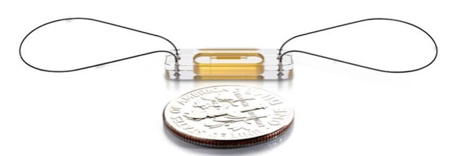Heart Failure Remote Monitoring Can Significantly Improve Quality of Life1
If you have congestive heart failure, it can be frightening to not know when your heart failure is worsening. What if there was a way to have your heart remotely monitored and avoid hospitalization?2
Find a heart failure clinic to book a consultation about the CardioMEMS™ HF System
Freedom to Live Your Life With the CardioMEMS HF System
“The CardioMEMS gave me back some of my old normal after things got stable. We were able to get my pulmonary pressure readings normal...I was able to return to traveling the country, seeing family.”
– Ashley, recipient of CardioMEMS HF System
Interested in learning more and hearing from others like you?
Talk with someone who has their heart monitored with the CardioMEMS HF System

Untreated Heart Failure Symptoms Can Be Deadly
Over time, heart failure (also called congestive heart failure), or a weak heart, will worsen when the heart can’t pump enough blood to meet your body’s needs. Heart failure symptoms like these can limit your activities and way of life without you even realizing it.
Signs and symptoms of heart failure can include:
Shortness of Breath
Feeling Tired
Swelling of Feet,
Ankles and Legs
Weight Gain
Find a Heart Failure Clinic Near Me
Find a heart failure specialist, or sometimes called a heart failure cardiologist, with advanced training for treating heart failure.
When you contact a heart failure clinic to request an appointment, you may be asked if you have a referral. Please speak to your care team or insurance company to find out if you need a referral to see a heart failure specialist.
Why have so many people chosen to have their heart monitored with the CardioMEMS HF System?
Fewer hospitalizations
78% reduction of being hospitalized again for your heart failure3
Improved Quality of Life
Patients managed with the CardioMEMS HF System showed a significant improvement in quality of life.1
Improved Survival
25% reduction in mortality for patients managed by hemodynamic monitoring4,5,6

What is the CardioMEMS HF System?
The CardioMEMS HF System is a wireless heart monitor that measures pulmonary artery pressure and heart rate for people with heart failure. If you have congestive heart failure, find a heart failure clinic near you and book a consultation.
The CardioMEMS™ PA Sensor is placed during a common procedure and allows your doctor to monitor the pulmonary artery pressure in your heart.
During this procedure, doctors access the pulmonary artery with a thin tube (called a catheter) that is guided through a vein to reach your heart.
After your CardioMEMS PA Sensor is placed, you will take daily readings remotely. It only takes a few minutes, and the information is sent to a secure website that your care team can access.
Your care team reviews the information, and will contact you if any changes to your medications or treatment plan are necessary.

The CardioMEMS HF System has helped more than 50,000 patients8, like Bob, take control of their heart failure and live their best life.
“It makes life easy for me, so I’m grateful”
— Bob, recipient of the CardioMEMS™ HF System*
Frequently Asked Questions
How will I know if the CardioMEMS HF System is right for me?
You will be evaluated by a heart failure specialist, which could include an interventional cardiologist and a heart failure cardiologist. There are several factors they will take into consideration when deciding whether or not you should receive the CardioMEMS HF System. Find a clinic near you.
Why should you consider the CardioMEMS HF System?
Through remote monitoring, the CardioMEMS HF System can help you live your best life by:
- Allowing you to do your day-to-day activities with confidence knowing your care team is monitoring your heart failure
- Reducing your chances of a heart failure hospitalization7
- Partnering you with your care team to change treatment before any symptoms might appear
How long does the CardioMEMS HF System last?
The PA sensor does not need a battery or replaceable parts and is intended to last for your lifetime.8
Can I have an MRI if I have the CardioMEMS HF System?
You can have an MRI scan under certain conditions.8 Talk with the doctor ordering the MRI scan to ensure that he or she knows that you have a CardioMEMS PA Sensor.
Is the procedure covered by insurance or Medicare?
The procedure may be covered by health insurance or Medicare. When you speak to the medical center, after they determine you are a candidate, they can help explain your coverage options.
How do I find a CardioMEMS HF System clinic near me?
You can find a clinic by using our clinic finder. Search for a center near you by city, state or zip code.
Discuss all treatment options with a heart failure specialist
The specialist can describe the risks and benefits and help you decide which option is right for you.

*This testimonial relates an account of an individual’s response to the treatment. This patient’s account is genuine, typical and documented. However, it does not provide any indication, guide, warranty or guarantee as to the response other persons may have to the treatment. Responses to the treatment discussed can and do vary and are specific to the individual patient.
Abbott does not endorse any of the clinics on this locator, but merely provides them as a courtesy to patients. Nor does Abbott represent that this is a full list of clinics in a particular location. The clinics are included in the locator because they provide implantable device support for Abbott devices; therefore, the directory is not meant to be an endorsement for any particular clinic. Note that Abbott is a medical device manufacturer and cannot provide medical advice.
These materials are not intended to replace your doctor's advice or information. For any questions or concerns you may have regarding the medical procedures, devices and/or your personal health, please discuss these with your physician.
References
- Brugts, J et al. Remote haemodynamic monitoring of pulmonary artery pressures in patients with chronic heart failure (MONITOR-HF): a randomised clinical trial. The Lancet. May 20, 2023. https://doi.org/10.1016/S0140-6736(23)00923-6
- Adamson PB. Pathophysiology of the transition from chronic compensated and acute decompensated heart failure: new insights from continuous monitoring devices. Current Heart Failure Reports. 2009;6:287-292.
- Setoguchi S, Stevenson LW, Schneeweiss S. Repeated hospitalizations predict mortality in the community population with heart failure. Am Heart J. 2007 Aug;154(2):260-6.
- Abraham J, et al. Association of Ambulatory Hemodynamic Monitoring with Clinical Outcomes in a Concurrent Matched Cohort Analysis. JAMA Cardiology. 2019;4(6):556-563.
- Givertz MM, Stevenson LW, Costanzo MR, et al., on behalf of the CHAMPION Trial Investigators. Pulmonary artery pressure–guided management of patients with heart failure and reduced ejection fraction. J Am Coll Cardiol. 2017; 70:1875–86.
- Lindenfeld, J, Costanzo, M, Zile, M. et al. Implantable Hemodynamic Monitors Improve Survival in Patients With Heart Failure and Reduced Ejection Fraction. J Am Coll Cardiol. 2024 Feb, 83 (6) 682–694.
- Abraham WT, Stevenson L. Bourge RC, Lindenfield J, Bauman J. Adamson PV. Sustained efficacy of pulmonary artery pressure guide to adjustment of chronic heart failure therapy: Complete follow-up results from the CHAMPION randomized trial. The Lancet. 2016;387(10017):453-461. https://doi.org/10.1016/S0140-6736(15)00723-0.
- Abbott data on file.
MAT-2306689 v4.0
